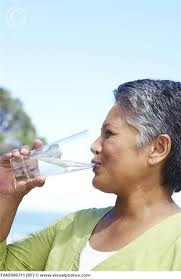 Water, it’s the most essential chemical substances for life. We could not survive without this clear, odorless and tasteless (1) nutrient within a matter of days. Water is regulated by the kidneys, and therefore drinking plenty of water on a daily basis will protect these two vital organs.
Water, it’s the most essential chemical substances for life. We could not survive without this clear, odorless and tasteless (1) nutrient within a matter of days. Water is regulated by the kidneys, and therefore drinking plenty of water on a daily basis will protect these two vital organs.
However, as the healthy kidneys age, they will function normal but slower. The kidney’s function decrease due to physiological changes such as the reduction of the number of filtering units (the nephrons) which filter waste from the blood, and a decrease in the kidneys tissue and blood supply (2). In addition, the elderly experience a dysfunction in the thirst mechanism (hypodipsia), causing lower fluid intake (3).
Now add an illness, disease and/or medications, and there will be more added stress to these organs. Furthermore, daily activity limitations, cold climates and issues with bladder problems, will enhance inadequate fluid intake to this population as well (3).
So, with reduction in the kidney’s function and dysfunction of the thirst mechanism, illness, medications, heat/cold climates and limited activities, the elderly are at greater risk of dehydration.
Also, on average, an adult body is about 55-65% water (4); and infants 70-75% (3). Since we are focusing on the elderly, you should know that their bodies are mostly compromise of about 50% from water (3), mostly due to a decrease in lean body mass and an increase in adipose tissue. This decrease in water percentage can increase their risk of dehydration when fever, stress and even hot climates are present (5).
If you are a senior concerned about not getting enough fluids to keep you healthy here are some tips that may help you stay hydrated: Learn to drink plenty of fluids regularly, especially water, and not when thirsty (unless you are person on fluid restrictions). Help educate and explain to your older parents or grandparents on the reasons and importance of staying hydrated. Avoid sodas, and too many caffeinated drinks, they are often dehydrating. Know that there are other was ways of getting fluids, and they’re from the foods you eat and the foods you metabolize.
Here are the tops high water containing foods: Fat free milk, cantaloupe, strawberries, water melon, lettuce, cabbage, celery, spinach, pickles, squash (cooked), fruit juice, yogurt, apples, oranges, carrots, broccoli(cooked), pears, and pineapple(5).
Here is the list from The USDA National Nutrient Database (3):
|
Water containing foods |
|
| 100% | Water |
| 90-99% | Fat free milk, cantaloupe, strawberries, water melon, lettuce, cabbage, celery, spinach, pickles, squash(cooked) |
| 80-89% | Fruit juice, yogurt, apples, oranges, carrots, broccoli(cooked), pears, pineapple |
| 70-79% | Bananas, avocados, cottage cheese, potatoes (baked), corn (cooked), shrimp |
| 60-69% | Pasta, legumes, salmon, ice cream, chicken breast |
| 50-59% | Ground beef, hot dogs, feta cheese, tenderloin steak (cooked) |
| 40-49% | Pizza |
| 30-39% | Cheddar cheese, bagels, bread |
| 20-29% | Pepperoni sausage |
| 10-19% | Butter, margarine, raisins |
| 1-9% | Walnuts, peanuts, (dry roasted), chocolate chip cookies, crackers, cereals, pretzels, taco shells, peanut butter |
| 0% | Oils, sugar |
Source: The USDA National Nutrient Database for Standard Reference, Release 21 provided in Altman.127
Water recommendation for adults: (0.06 glasses per pound of body weight) for total water consumption (6).
1. www.thefreedictionary.com/water
2. Aging changes in the kidneys. http://www.nlm.nih.gov/medlineplus/ency/article/004010.htm
3. Popkin, BM, D’Anci, KE, Rosenberg IH. Water, Hydration and Health. Nutr Rev. 2010 August; 68(8): 439-458.[PubMed 20646222]
4. http://www.boston.com/globe/search/stories/health/how_and_why/011298.htm
5. Understanding Nutrition/EleanorNoss Whitney, Sharon Rady Rolfes. -6th ed. Pg 536
6. http://www.cnpp.usda.gov/…/NutritionInsights/Insight27.pdf
Comments
Powered by Facebook Comments

Connect with Us on These Sites